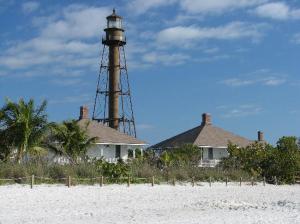Waterfront homeowners can’t build docks in FL coastal community

By William Patrick | Florida Watchdog
TALLAHASSEE, Fla. — For more than 20 years, waterfront homeowners living along the city of Sanibel, on Florida’s San Carlos Bay, have been barred from building boating docks.
BANNED: The city of Sanibel, Florida banned residential docks 20 years ago along the San Carlos Bay, from Dixie Beach to the city lighthouse, above. But reason why, doesn’t hold water, according to some residents.
It’s tough luck for homes not grandfathered in, as resale values in the gulf community — where boating is in part a way of life — are directly affected.
It’s even tougher for owners who believe the reasoning for the ban doesn’t hold any water.
So when the city government decided to build its own dock in the restricted area eight years ago, some residents started speaking up. Their stop could be the U.S. Supreme Court.
According to Mark Miller, managing attorney for the Pacific Legal Foundation’s Atlantic Center, the dock ban violates basic property rights. It limits what homeowners can do with their property based on the city’s desire to protect submerged sea grasses. That’s not to say area sea grasses aren’t important, acknowledges Miller.
San Carlos Bay sea grasses are valuable habitats for the marine ecosystem, Eric Milbrandt, marine lab director of the Sanibel-Captiva Conservation Foundation, told Watchdog.org.
“It serves as nursery grounds for invertebrates and fish species, like red fish, grouper and snook,” Milbrandt said.
“Sea grass holds sand in place. Loss of sea grass allows for sand to move around and that negatively affects everyone, not just the dock owner,” he added.
What if there’s no submerged sea grass next to a home in the restricted area? Could a homeowner build a dock?
The answer, unfortunately, for David and Susan Kentner, is an unequivocal “no.”
But the city government can.
“It’s a monstrosity. It’s concrete and it has multiple boat slips. It’s not an ordinary wooden-plant dock,” said Steve Gieseler, a local attorney representing the Kentners and Robert and Diane Williams, about the taxpayer-funded dock constructed in the restricted area along San Carlos Bay.
Sanibel City Attorney Kenneth B. Cuyler told Watchdog.org in an email the city council determined its dock was necessary “for public health and safety purposes.”
“The city did not build a residential boat dock for recreational purposes and did not construct the dock adjacent to, connected to, or for use by a residential parcel, which was the prohibition in the 1993 ordinance,” he said.
The four-boat concrete structure is used by city police and fire departments, for the benefit of all residents and visitors to Sanibel, Cuyler asserted.
To homeowners it looks like little more than a “do as I say, not as I do” city policy.
“It undermines the premise of the dock ban,” Gieseler said.
The Kentners and Williamses have been pushing back ever since. The Kenters even sought, and received, approval to build their dock from the Florida Department of Environmental Protection and the U.S. Army Corps of Engineers.
Still, the local government said no.
“The paradox between what the city allowed for itself and the type of wooden residential dock they won’t allow, is striking,” Gieseler told Watchdog.org.
The Pacific Legal Foundation filed a petition for writ of certiorari with the U.S. Supreme Court earlier this month, asking the court to review the case. The stakes are high, Miller said. “Local governments and their attorneys watch what the courts allow,” he said.
PLF is no stranger to the high court. Last year, PLF won a major property rights victory, 5-4, for the Koontz family, of Central Florida. In 2012, the court ruled 9-0 in favor of the Sackett family, also represented by PLF.
But this case is far from certain. Two federal courts have already ruled against the Kentners and Williamses, as Cuyler duly noted in his email.
A federal judge in the Middle District of Florida first dismissed the case, and more recently the 11th Circuit Court in Atlanta dismissed an appeal.
The problem, according to Miller, is the lower courts didn’t afford property rights the same protections as other fundamental rights. “They look at property as a lower-level right, if you will,” Miller explained. “We’re challenging that.”
Case law has long held the government must advance a legitimate purpose if it’s going to limit, or take, a private individual’s property.
The lack of sea grass relating to the Kentners’ home, and the advent of new docks over the past 20 years that largely reduce harm to sea grasses, and in some cases even accentuate its growth, should warrant a fair challenge to the ban, the attorneys say.
“They don’t allow our clients to show that they can build a dock that won’t hurt sea grass. It’s not a fair process,” said Miller. “It’s sea grass in this case, but imagine what other incantations the government could come up with, then contradict for its own use, and no one an do anything about it.”







